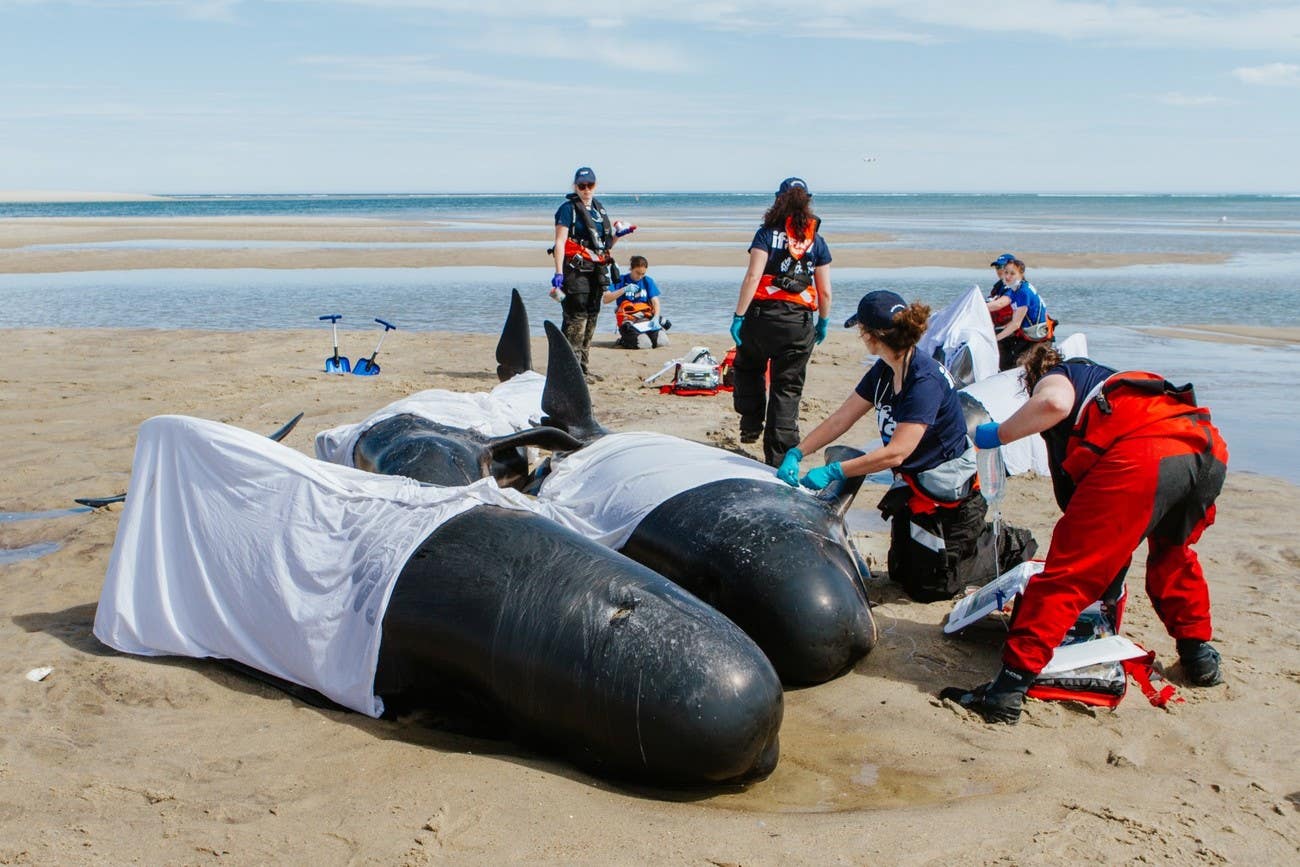Helping Hand: Volunteers save 125 dolphins in massive Cape Cod stranding
The Herring River ‘Gut’ is notorious for strandings due to its hook-like shape and extreme tidal fluctuations.

IFAW’s marine mammal rescue & research team provides supportive care to five stranded pilot whales. (CREDIT: IFAW)
In a rare and dramatic event, 125 dolphins became stranded in shallow mud flats off Cape Cod, marking the largest mass stranding incident in decades according to the International Fund for Animal Welfare (IFAW).
The initial report early Friday morning indicated only ten Atlantic white-sided dolphins near the shore of Wellfleet. However, as IFAW staff and volunteers arrived, they discovered 125 dolphins stranded – the largest single mass stranding in IFAW's 26-year history on Cape Cod. Tragically, ten dolphins had already died.
"We arrived to what appeared to be 80 to 100 dolphins on the shallow mud flats of Wellfleet’s Herring River 'Gut' – a global epicenter for mass strandings," said Misty Niemeyer, IFAW’s stranding coordinator. "We provided supportive care, helped those that were struggling, and kept them comfortable until the incoming tide."
The rescue operation involved herding the dolphins back to deeper waters, first on foot and later using boats as the tide rose at 4:56 pm. Two IFAW vessels and the Wellfleet Harbormaster worked tirelessly until sunset at 8:15 pm to guide the dolphins to safety.
The Herring River 'Gut' is notorious for strandings due to its hook-like shape and extreme tidal fluctuations.
"This rescue had many challenges due to the number of dolphins, the large size of many of the animals, how spread out they were over a large area, the difficult mud conditions, and the complicated locations from which we could reach them," said Niemeyer. "It was a 12-hour exhausting response in the unrelenting sun, but the team was able to overcome the various challenges and give the dolphins their best chance at survival."
As night fell, most dolphins seemed to have reached deeper waters offshore, though a dozen or more remained in the inner harbor at sunset on Friday. The rescue effort involved over 150 people, including at least 25 IFAW staff, 100 trained volunteers, and additional help from AmeriCorps of Cape Cod, Whale and Dolphin Conservation, the New England Aquarium, the Center for Coastal Studies, and the Wellfleet Harbormaster.
Early Saturday morning, IFAW teams were back on the water and found ten dolphins swimming in a hazardous area. They successfully herded them towards safer, deeper waters. Meanwhile, scouts discovered another group of 25 dolphins swimming near the shore in Eastham, where herding efforts continued as the tide dropped through midday.
IFAW's response to this unprecedented event highlights the complexities and dedication required to save marine life in such challenging circumstances. Despite the difficulties, the coordinated efforts of IFAW staff, volunteers, and partner organizations provided these dolphins with the best possible chance for survival.
Note: Materials provided above by the The Brighter Side of News. Content may be edited for style and length.
Like these kind of feel good stories? Get the Brighter Side of News' newsletter.
Rebecca Shavit
Science & Technology Journalist | Innovation Storyteller
Based in Los Angeles, Rebecca Shavit is a dedicated science and technology journalist who writes for The Brighter Side of News, an online publication committed to highlighting positive and transformative stories from around the world. With a passion for uncovering groundbreaking discoveries and innovations, she brings to light the scientific advancements shaping a better future. Her reporting spans a wide range of topics, from cutting-edge medical breakthroughs and artificial intelligence to green technology and space exploration. With a keen ability to translate complex concepts into engaging and accessible stories, she makes science and innovation relatable to a broad audience.



